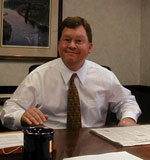The tax debate: A delicate balance
By Mark Zdechlik, Minnesota Public Radio
June 21, 2001
|
|
RealAudio |
Much of the push for property-tax reform at the Capitol is coming from Minnesota businesses. Business leaders say to remain competitive Minnesota must continue cutting taxes. Critics of the plan say it would shift the burden of paying property taxes from businesses to homeowners. They say homeowners pay enough already and there are good reasons for commercial and industrial properties to pay a higher rate.
| |
|
|
|
||
IN A FACTORY IN SOUTHEAST MINNEAPOLIS, a large laser precisely cuts into a sheet of metal destined down the line to become part of a computer cooling system.
This facility is one of five Upper Midwest Industries plants. The company has about 300 employees. CEO David Carlsen, the former chairman of the Minnesota Chamber of Commerce says Minnesota businesses are at a disadvantage relative to competitors in other states - and in other countries - because of the state's commerical-industrial property-tax rates.
"I think the issue is competitiveness. If we are in the top 10, that means there are 40 or 45 other states that have figured out how to have more competitive property taxes on their businesses. And we're not asking to be the lowest we're just asking to not be at the top," Carlsen says.
The Minnesota Taxpayers Association says even though business property-tax rates have decreased in recent years, Minnesota's commercial property taxes rank among the five highest in the nation; industrial property taxes are among the top 20.
The tax proposals lawmakers are deadlocked over at the Capitol would take Minnesota out of the top 10, first by shifting the cost of education entirely from local property taxes to the state's general fund. The plans would also cut tax rates on business property.
Those cuts, which vary between the House and Senate plans, would be offset by a new statewide property tax on businesses. Even with that new tax, under both plans businesses overall would see a 10 percent - or $160 million - net reduction.
In the case of Upper Midwest Industries, David Carlsen says that's a $25,000 annual tax break. "With a 10-percent reduction we could lower our hourly rates that we use for quoting work against our competitors. We could lower our costs for our customers," Carlsen says.
| |
|
|
|
||
"If you need $100 to run government and you have not cut the values on businesses and cut the values on homes and you still need the $100 dollars to run government, who does it come from? It comes from lowered valued homes. That's the only thing left to tax," Bulboltz maintains.
But some business owners acknowledge homeowners could face higher taxes. But they say if that happens, it will be because local governments are spending too much. They hope a reformed property-tax system will make homeowners more aware of the true cost of government services and more apt to hold local government officials accountable for their spending.
"Business just seems to be like a cash cow. The business community at this point is a buffer between what actually transpires in government as it affects the taxpayer," says Gus Davis, who owns a Culligan water softening franchise in St. Peter. He's testified before the House Taxes Committee in favor of more evenly spreading the burden of property taxes.
Senate Democrats say their goal is to make taxes fair, but getting there has proven more difficult than anyone expected.


